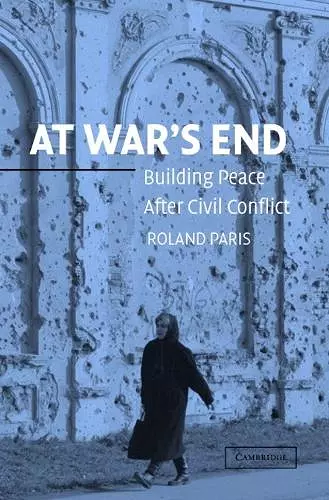At War's End
Building Peace after Civil Conflict
Format:Paperback
Publisher:Cambridge University Press
Published:24th May '04
Currently unavailable, and unfortunately no date known when it will be back
This paperback is available in another edition too:
- Hardback£75.00(9780521834124)

This 2004 book explores the challenge of rehabilitating countries after civil wars.
Exploring the challenge of rehabilitating countries after civil wars, this 2004 book finds that if democracy and capitalism are introduced too quickly they can increase danger of renewed fighting. A more effective approach to post-conflict peacebuilding would be to introduce political and economic reform in a more gradual and controlled manner.All fourteen major peacebuilding missions launched between 1989 and 1999 shared a common strategy for consolidating peace after internal conflicts: immediate democratization and marketization. Transforming war-shattered states into market democracies is basically sound, but pushing this process too quickly can have damaging and destabilizing effects. The process of liberalization is inherently tumultuous, and can undermine the prospects for stable peace. A more sensible approach to post-conflict peacebuilding would seek, first, to establish a system of domestic institutions that are capable of managing the destabilizing effects of democratization and marketization within peaceful bounds and only then phase in political and economic reforms slowly, as conditions warrant. Peacebuilders should establish the foundations of effective governmental institutions prior to launching wholesale liberalization programs. Avoiding the problems that marred many peacebuilding operations in the 1990s will require longer-lasting and, ultimately, more intrusive forms of intervention in the domestic affairs of these states. This book was first published in 2004.
'At War's End is the state of the art treatment of the dilemmas of reconstruction and peacebuilding after war, intervention and civil conflict.' Michael Ignatieff, Director, Carr Center for Human Rights Policy, Harvard University
'At a moment when politicians and pundits are debating the wisdom of nation-building, Roland Paris brings us an important and groundbreaking book. Theoretically rich, historically informed, and analytically innovative, this authoritative volume will be invaluable to scholars and practitioners alike who are interested in understanding what it takes to build peace after civil wars' Thomas G. Weiss, Presidential Professor and Director, Ralph Bunche Institute for International Studies, CUNY Graduate Center
'This is the best book yet written on peacebuilding operations, a must for both academics and practitioners.' Peter Viggo Jakobsen, Associate Professor in International Relations, University of Copenhagen
'It is hard to imagine a more timely study than Roland Paris's superb analysis of the peacebuilding experience of the last decade. As the United States gropes its way through the morass of Iraq, its leaders need to read At War's End and concentrate on developing timetables and building institutions.' Robert A. Pastor, Vice President of International Affairs, American University
'This book will surely stand as the definitive treatment of the intellectual and ideological origins of international peacekeeping and peacebuilding in the post-Cold War era. The breadth of cases, the rigorous assessment of outcomes, and depth of policy insight are most impressive.' Fen Osler Hampson, Professor of International Affairs and Director, Norman Paterson School of International Affairs, Carleton University
'Few studies of peacekeeping and peacebuilding merit the description 'breakthrough.'…This is one of them.' Michael Pugh, Director, University of Plymouth International Studies Centre and Editor, International Peacekeeping Journal
'At War's End is a major contribution to an understanding of the theory, practice, and consequences of peacekeeping that should be read by scholars and practitioners alike. Roland Paris expertly demonstrates how peacekeeping has evolved from the modest attempt to keep the peace into the much more ambitious agenda of engineering the socio-political conditions for a stable peace. But, as Paris documents, the road to hell can be paved with good intentions; the attempt by the international community to promote democracy and markets has created, in various places, not a liberal peace but instead renewed competition and violence. His recommendations should be debated seriously by all those who are concerned about the future of peacekeeping.' Michael Barnett, Professor of Political Science and Director, International Relations Program, University of Wisconsin
'… At war's end deserves to become the essential text on peacebuilding operations for practitioners and analysts alike.' International Affairs
'At War's End is a timely and very good addition to the growing literature in post-conflict studies. … Paris's book is appropriate for any liberalization or conflict studies, as both are covered aptly. It is a strong addition to the literature on peacebuilding methods and strategies.' Journal of Peace Research
'Roland Paris does us a great service in At War's End by stripping peacebuilding back to its ideological origins and providing the reader with a useful assessment of the theoretical assumptions which underlie it.' Democratiya
ISBN: 9780521541978
Dimensions: 228mm x 151mm x 21mm
Weight: 416g
304 pages